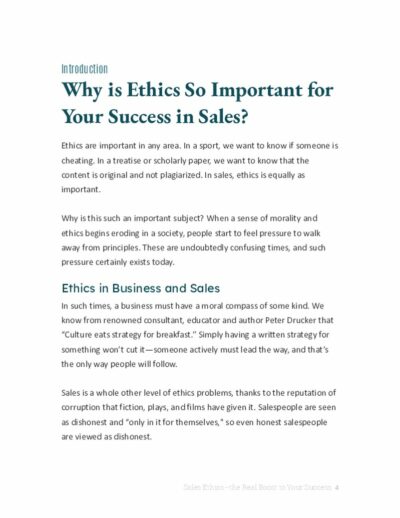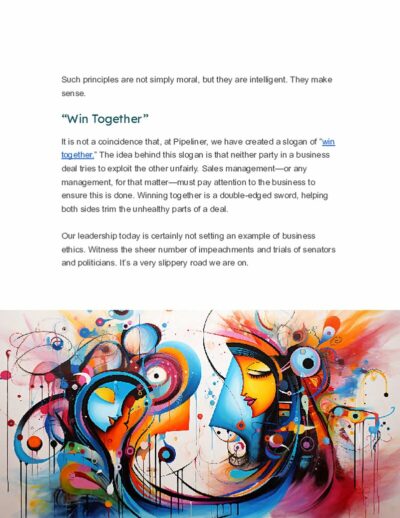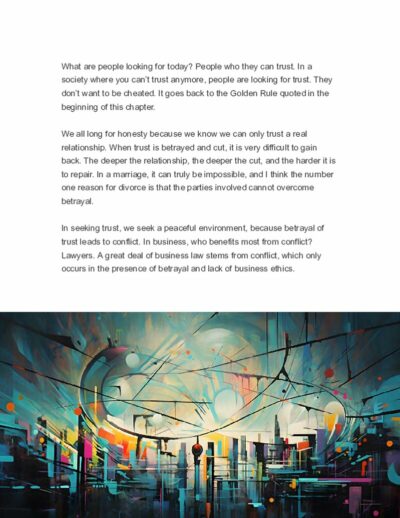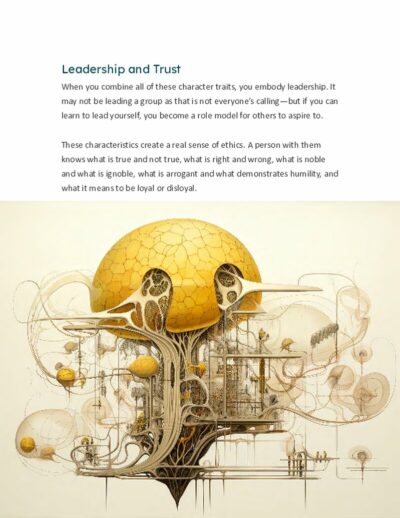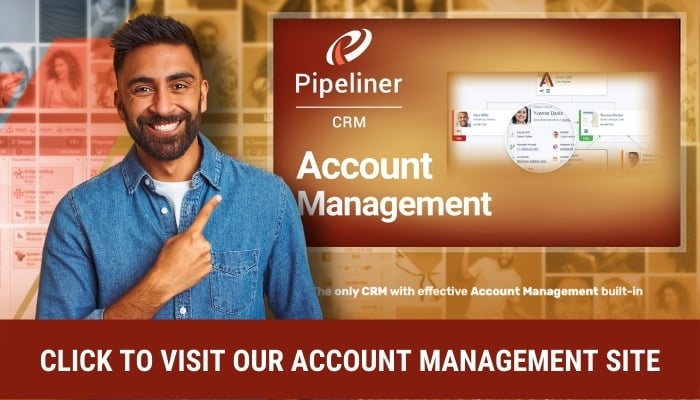
Sales Ethics—the Real Boost to Your Success
Why is Ethics So Important for Your Success in Sales?
Ethics are essential in any field, including sports and academia. A lack of ethics can leadLead Lead refers to a prospect or potential customer (who can be an individual or organization) that exhibits interest in your service or product; or any additional information about such entity. to a breakdown of principles and open the door to all kinds of misconduct. In sales, this is a particular problem due to a reputation for corruption portrayed in the media, which makes even honest salespeople seem dishonest. The author contends that without a moral compass, a business’s written strategy won’t work, and people will not follow the leadership. Widespread doubt, which comes from an unreliable sales force, can lead to other problems as people rationalize their dishonest behavior by pointing to the lies of others. The ebook asserts that it is crucial to face this reality and not be naive about the current state of business ethics.
Chapter 1 › Business Ethics and Sustainability
This chapter makes the case that ethical behavior is not only a moral choice but a strategic advantage for a business, leading to sustainable success and growth. The ebook defines a “short win” as unsustainable, as it can be upsetting for the buyerBuyer A buyer is an individual or organizational entity that purchases a product or subscribes to a service. and ultimately damaging to the seller and their company. The author proposes that a business should have a moral compass composed of principles like the Golden Rule (“Do unto others as you would have them do unto you”) and altruism. These principles are considered intelligent because they make sense and are a superior way to operate. The ebook also highlights the importance of trust and honesty in building lasting relationships, noting that a company’s customers create its reputation. The currency of the future, according to the author, is recommendations, and a customerCustomer Customer is an individual or an organization that purchases a product or signs up for a service offered by a business. base is a company’s best marketingMarketing Marketing is the field, set of actions, or practice of making a product or service desirable to a target consumer segment, with the ultimate aim of effecting a purchase. tool when the business is honest and ethical.
Chapter 2 › Sales Ethics: Values…or Principles?
The distinction between values and principles, arguing that businesses should operate on principles because they are universal and apply everywhere. Values, in contrast, are contextualized and can be violated when they don’t make sense in certain situations. The author suggests that business ethics codes should be based on principles to be effective and that they must have meaning for people to follow them. An example of a principle-based code is refraining from making illicit political expenditures. The author points out that when people in power and the media ignore principles, it sets a bad example for society, leading to the erosion of ethical behavior.
Chapter 3 › Ethics and Wisdom in Sales
This chapter defines ethics as a combination of both the mind and the heart. The mind understands what is right and wrong, while the heart provides compassion and understanding. Ethics, therefore, cannot be a simple checklist of rules but must be a lived experience. The author argues that reducing ethics to a single formula doesn’t work in a complex, multi-dimensional world that isn’t black and white. The ebook also emphasizes that wisdom is the application of fundamental ethics in a given situation, which leads to good judgment. Wisdom is knowledge practiced over time, and it may sometimes dictate that a rule be set aside.
Chapter 4 › Sales Ethics Characteristics
The book concludes by discussing the vital character traits necessary for a salesperson’s success. Citing an ancient proverb, the author highlights that a person’s thoughts become their words, which become their actions, habits, and ultimately, their character and destiny. Key characteristics of a successful salesperson include:
- Belief in the company and productProduct Product refers to anything (an idea, item, service, process or information) that meets a need or a desire and is offered to a market, usually but not always at a price.: A salesperson must be an evangelist for what they are selling, as prospects can tell if they don’t believe in it.
- Kindness and humility: People are more likely to want to do business with someone kind and humble, rather than someone arrogant.
- Patience and teachability: Successful salespeople exercise self-control and are willing to learn about their products, company, and customers.
- Integrity: This is the most important characteristic and the foundation for all others, encompassing truthfulness and loyalty to customers, company, and colleagues.
The ebook provides two exercises to help salespeople change a negative mindset by focusing on the costs of holding onto negative attitudes and the benefits of letting them go.
Learn More About Pipeliner CRM
Take a no-obligation 14 day trial of Pipeliner CRM.
No credit card info required – just experience for yourself how it could impact your sales.
Additional Resources
This ebook is on the subject of “Win Together.” It falls under the same context as“win-to-win” described in my book Network Selling: Guarantee Success for the Digital Age. Today, this aspect of sales is more important than ever, and must also be part and parcel of CRM solutions.
“For some years I’ve been saying that, as a society, we’re in the midst of a transformation. Given what’s happened in the last couple of years, there’s no one left who is disagreeing with me! It’s become very obvious.”
 Nikolaus Kimla, CEO at Pipelinersales, Inc.
Nikolaus Kimla, CEO at Pipelinersales, Inc.A common term in sales today is EQ, which stands for “emotional I.Q.” It means the skill a salesperson has in reading emotions and utilizing them in sales. It means empathy and a number of other abilities. The short version is, it’s an I.Q. when it comes to emotions. But just as with our Network Selling model, E.Q. isn’t just for sales, either. It’s actually the missing factor in human interactions, for confrontation—a common “tool” in human interactions—doesn’t actually handle anything.
“You can have everything in life you want if you will just help enough other people get what they want.”
 Zig Ziglar
Zig Ziglar
